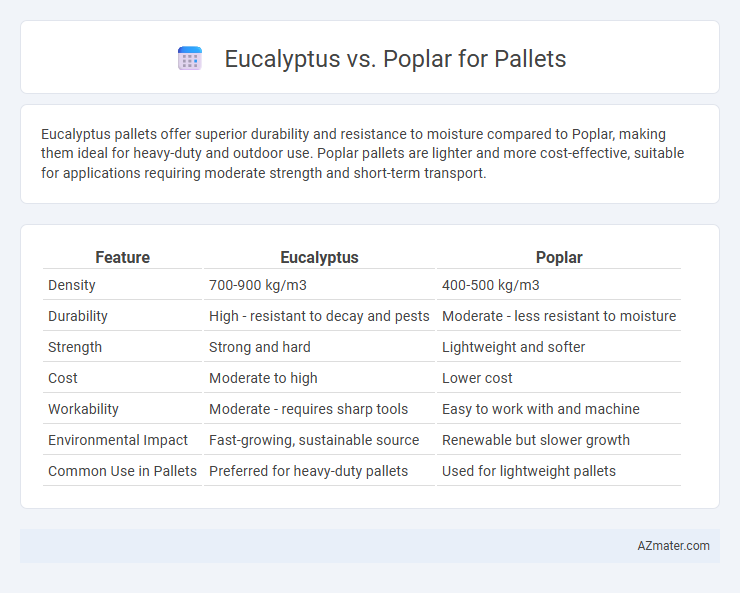Eucalyptus pallets offer superior durability and resistance to moisture compared to Poplar, making them ideal for heavy-duty and outdoor use. Poplar pallets are lighter and more cost-effective, suitable for applications requiring moderate strength and short-term transport.
Table of Comparison
| Feature | Eucalyptus | Poplar |
|---|---|---|
| Density | 700-900 kg/m3 | 400-500 kg/m3 |
| Durability | High - resistant to decay and pests | Moderate - less resistant to moisture |
| Strength | Strong and hard | Lightweight and softer |
| Cost | Moderate to high | Lower cost |
| Workability | Moderate - requires sharp tools | Easy to work with and machine |
| Environmental Impact | Fast-growing, sustainable source | Renewable but slower growth |
| Common Use in Pallets | Preferred for heavy-duty pallets | Used for lightweight pallets |
Introduction to Eucalyptus and Poplar for Pallet Production
Eucalyptus is a fast-growing hardwood species valued in pallet production for its high density and durability, making it ideal for heavy-duty pallets. Poplar, a lightweight softwood, offers excellent workability and cost-effectiveness, commonly used for pallets requiring moderate strength and easier handling. Both woods provide sustainable options, with eucalyptus delivering greater strength and poplar excelling in affordability and rapid growth.
Wood Properties: Eucalyptus vs Poplar
Eucalyptus wood offers high density, durability, and resistance to wear, making it ideal for heavy-duty pallets requiring strength and longevity. Poplar wood, characterized by its lighter weight and moderate hardness, provides good shock absorption but lower tensile strength compared to eucalyptus. The choice between eucalyptus and poplar for pallets depends on the need for robustness versus ease of handling and cost efficiency.
Strength and Durability Comparison
Eucalyptus pallets offer superior strength due to their dense hardwood composition, making them highly resistant to heavy loads and impacts. Poplar, being a softer hardwood, provides moderate durability but is more prone to denting and wear under heavy usage. Eucalyptus pallets also demonstrate excellent resistance to moisture and fungal decay, enhancing their longevity compared to the relatively less durable poplar pallets in industrial handling environments.
Weight and Handling Efficiency
Eucalyptus pallets generally weigh more than poplar pallets, impacting handling efficiency in logistics and material movement. The higher density of eucalyptus provides enhanced durability but may require greater lifting effort, influencing worker fatigue and equipment choice. Poplar pallets, being lighter, offer improved maneuverability and faster processing times, optimizing warehouse operations and reducing transport fuel consumption.
Cost Analysis: Eucalyptus vs Poplar Pallets
Eucalyptus pallets generally offer a lower initial cost due to the fast-growing nature of eucalyptus trees, making raw material more abundant and affordable. Poplar pallets, while slightly more expensive upfront, provide better durability and resistance to impact, potentially reducing long-term replacement costs. Analyzing total cost of ownership reveals eucalyptus pallets as cost-effective for short-term use, whereas poplar pallets may yield greater value in applications requiring extended pallet lifespan.
Environmental Impact and Sustainability
Eucalyptus pallets offer rapid growth and high yield, making them a sustainable choice due to efficient land use and carbon sequestration, whereas poplar pallets benefit from faster decomposition and biodegradability, reducing landfill impact. Eucalyptus plantations can sometimes strain water resources, while poplar cultivation typically requires less water, promoting better ecosystem balance. Both wood types support renewable forestry practices, but poplar's shorter life cycle enhances circular economy principles by facilitating faster material recovery and reuse.
Availability and Sourcing Challenges
Eucalyptus pallets benefit from widespread plantations in tropical and subtropical regions, ensuring consistent availability but face challenges due to longer maturation cycles and localized harvesting restrictions. Poplar pallets, sourced mainly from temperate zones with faster growth rates, offer quicker turnover and easier replenishment, though limited regional cultivation can create supply bottlenecks. Both species encounter logistical challenges related to transportation costs and sustainable sourcing certification requirements affecting market accessibility.
Pest and Decay Resistance
Eucalyptus wood offers superior pest and decay resistance compared to poplar, making it a preferred choice for pallets exposed to harsh environmental conditions. Its natural oils provide effective protection against termites and fungal attacks, extending the lifespan of pallets used in outdoor or damp settings. Poplar, while lighter and easier to work with, is more susceptible to insect infestation and decay, reducing its durability for long-term pallet use.
Application Suitability in Different Industries
Eucalyptus offers superior durability and moisture resistance, making it highly suitable for heavy-duty pallet applications in industries like construction, chemicals, and export shipping where strength and weather resilience are critical. Poplar provides a lighter, more cost-effective alternative with good shock absorption properties, ideal for lighter loads and industries such as retail, food processing, and warehousing where frequent handling and quick turnaround are common. Selecting between eucalyptus and poplar pallets depends on balancing weight capacity requirements, environmental exposure, and cost-efficiency tailored to specific industrial logistics needs.
Conclusion: Choosing the Best Wood for Pallets
Eucalyptus offers superior durability and faster growth compared to poplar, making it a cost-effective choice for pallet production in high-demand environments. Poplar's lighter weight and smoother surface provide easier handling and better finish for specific pallet uses, but it may lack the strength needed for heavy loads. Selecting the best wood depends on balancing eucalyptus's robustness and poplar's workability against the specific requirements of pallet lifespan and load capacity.

Infographic: Eucalyptus vs Poplar for Pallet
 azmater.com
azmater.com